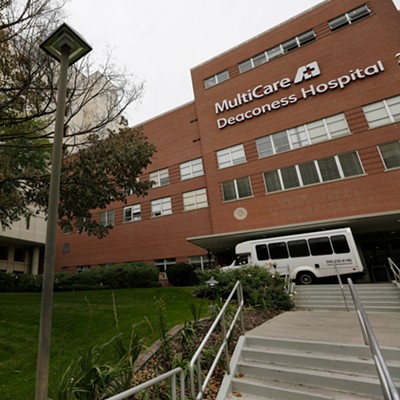
Ask people who've gone through or worked in the criminal justice system, and they'll tell you that the effects of the war on drugs extend far beyond the trauma of spending time behind bars or getting a criminal record.
Before someone is convicted of a crime, even an arrest can lead to life-changing setbacks, such as losing a job, a car, a driver's license, housing or a relationship. When multiple incidents stack up, it can weave a complicated web to untangle before someone can get back to something resembling normal after they're released from incarceration.
Importantly, not everyone has experienced the "war" the same way: Those arrested for drug use since President Richard Nixon declared drug abuse "public enemy number one" in 1971 have disproportionately been poorer and people of color.
Now, Washington state is trying to address some of those disproportionate wrongs by investing $200 million to combat the lingering effects, from helping people vacate criminal convictions to giving them financial assistance to increase their access to economic opportunities and housing.
The Legislature allocated the money in 2022, and the state Department of Commerce spent more than a year working with people with "lived experience" in the criminal justice system to draft the "Community Reinvestment Plan," which was released late last month.
While the majority of the $200 million has yet to be doled out — with the plan seeking to create services to help people buy homes, start businesses, launch careers and more over the next two years — the first $18 million has been allocated to groups to help with legal representation and reentry from incarceration.
Several Spokane organizations are among the first recipients, including Fulcrum Institute dispute resolution clinic; the Freedom Project, which provides nonviolent communication and mindfulness classes at correctional facilities; House of Mercy, which offers clean and sober living; Pioneer Human Services' Roadmap to Success program; and The Way to Justice, which provides post-conviction legal assistance and more.
Formed in 2020 by Virla Spencer and attorney Camerina Zorrozua, The Way to Justice is the largest local grantee, receiving more than $2.5 million to continue and expand its legal work with clients around the state. The two women formed the organization shortly after their previous employer, the Center for Justice, closed its doors.
"It was right in the midst of the racial justice movement that followed George Floyd and those other unnecessary police murders," Zorrozua says. "It was absolutely the wrong time to close down civil legal aid for the communities that we serve."
In part, they credit their successful application to their recent work helping clients impacted by the Washington Supreme Court's Blake decision, which overturned the state's drug possession law as unconstitutional in 2021. That opened the door for clinics to help people clear convictions from their records and remove court-imposed fees.
The nonprofit aims to address all of the needs of people who walk through its doors on Boone Avenue. Rather than simply screen to see if someone has a criminal record that can be cleared, staff members ask about everything that person might need, Spencer explains. Do they need a license? Do they need food? Do they need a job? Do they have a place to live?
If The Way to Justice can't help someone directly, they connect that person with another community partner via a "warm handoff."
"For us, it is about serving the people who are most vulnerable, serving the people who are often forgotten about, who are not accepted into society," Spencer says. "We meet them right where they are."
The state funding will enable The Way to Justice to hire two more attorneys to take on cases around the state, with the largest focus on Spokane, King, Pierce, Snohomish, Yakima and Clark counties. Those are the priority areas identified in the Community Reinvestment Plan, but services will also be provided in other counties.
Spencer says their unique holistic approach is proving successful. For example, she mentions a client who contacted them before he was set to finish a two-decade stint in prison. He was 17 when he went in, so when Spencer asked what help he needed, she realized that he may not even know what to ask for because he was just a kid when he was incarcerated. The Way to Justice first gave him basic necessities like a toothbrush and clothes.
"The following day, he came back, and I was able to get him lined up with a job. After that, he ended up getting permanent housing. He's been out for a year now — it's been very successful," Spencer says. "But I think about, like, what would have happened to that man if he had nobody to welcome him back into society?" ♦
























